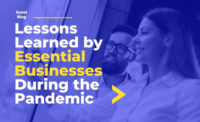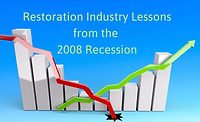Taking Lessons from the Last Economic Downturn into the Post-Pandemic Economy

While recently checking my notes from the 2008-2009 meltdown, I reviewed some thoughts that I’d put together then as to what changes would be needed to help clients make it through the aftermath of that economic downturn. The prime directive was to stay “profit focused.”
Out of that directive came the following realities and suggestions:
- The business climate was undergoing major change.
- Businesses were undergoing major pattern interruptions.
- Employee groups they were currently working with were going to have to change.
- Businesses needed to be rapidly right-sized so they could move forward profitably.
- On a similar note, deciding which employees stayed and which did not was a very tough decision, but needed to be made rapidly.
- Since no one wanted to pay the owner what the owner thought the business was worth, for the business to continue, the owner had to do the work to move the company forward.
- Deciding the best profit path for the future of businesses had to be based on data, not emotions.
- Owners were not as young as when they started, yet they had to work harder than when they started.
- Some companies did not make the cut; new start-ups would become the new leaders, replacing past leaders in their business arena.
- Everyone was expecting contractors to give more work for less money.
Necessities for Survival in a Post-Pandemic Economy
Software has been both improved and invented to assist in helping companies become and stay profitable. Today, software can yield real job costing in real time. What a lot of contractors have not yet realized is that having the software and using the software are two different things.
This is where accountability comes into play. Just because an employee is assigned a task and expected to use the software for documentation does not mean that task, and subsequent documentation, will be done as expected. In addition, companies giving contractors work are using some of the same software to determine what price they will pay, based on what the contractor reports they did the work for. A system needs to be developed that an entire company can to commit to. From there, the team can be held accountable and be judged as to whether or not they are doing what is needed to be done.
Companies seem to relax as they grow older and begin to lose profitability by not holding people accountable for the work that the company needs done at a consistent profit level. As a result, profitability begins to decrease at a time when both the company and the employees want increased compensation and perks.

So what does this have to do with where we are today? The major difference this time is that everything has been on pause. We’ve had an opportunity to think about what our next steps might be when the economy moves forward. Let’s see if the previous 10 steps might be a help to you moving forward today:
- The business climate is undergoing major change.
- Businesses are undergoing major pattern interruptions.
- Employee groups are going to have to change.
- Businesses may need to change team size quickly to be profitable.
- Owners looking to sell may have to wait a bit longer.
- Decisions for the future must be based on data, not emotions.
- Owners are back in the trenches.
- Some companies won’t make the cut.
- Everyone is expecting contractors to give more work for less money.
So what’s your plan?
Looking for a reprint of this article?
From high-res PDFs to custom plaques, order your copy today!







